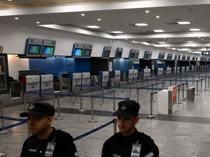Turkey ‘needs more growth than Central Bank estimates’
ISTANBUL

Turkey needs a growth around 6 percent at least, says Economy Minister Zafer Çağlayan.
The central bank formula is not Turkey’s destiny because it keeps the inflation rate, growth rate and ratio of current account deficit-to-national income unchanged at 5 percent, and growth is the key for reaching 2023 targets, Economy Minister Zafer Çağlayan said on Feb. 13.“Turkey needs at least 6 percent growth in order to achieve 2023 targets,” Çağlayan was quoted as telling reporters during his return from a trip to Libya.
Başçı said the country would be following a formula of “3x5,” whereby financial authorities will target an inflation rate of 5 percent, a growth rate of 5 percent and a current account deficit-to-GDP ratio of 5 percent.
However, Çağlayan said Turkey should grow more, adding that Turkey’s economy became more stable and stronger than Europe, making it the time to add “speed.”
Criticism on Central Bank
“We will not achieve what we expected last year. This is what I meant when I said ‘let’s put the foot on the gas,’” he said.
His comment referenced Central Bank Governor Erdem Başçı’s statement from late January that the economy has “disembarked from a plane and was travelling on the highway” following a soft landing last year.
Both Cağlayan and Prime Minister Recep Tayyip Erdogan, whose government has built its reputation on strong economic growth over the past decade, have picked up on Başçı’s analogy in recent weeks and used it to castigate his cautiousness.
“Turkey won’t reach its 2023 goals through the highway, we need to fly,” Erdoğan told a Turkey-Slovakia business forum last week.
The ratio of current account deficit to gross domestic product (GDP) was projected as 7.3 percent in the medium term program, but will probably be between 6 and 6.3 percent, he said.
While Turkey’s current account deficit was $77 billion in 2011, it fell to $48.9 billion by a $28.2 billion increase last year, he said, noting that it was a remarkable success for the Turkish economy. Despite domestic demand having shrunk last year, a rise in good and service exports ameliorated the deficit, he added. The success on current account deficit was in line with Central Bank strict monetary policy, Banking Regulation and Supervision Agency’s precautions and careful policies applied by finance ministry, Finance Minister Mehmet Şimşek said separately on the same day.
















